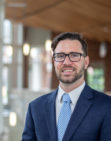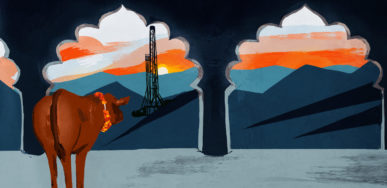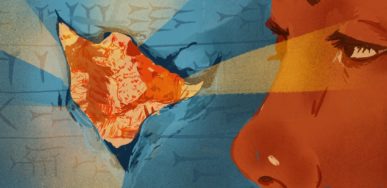[00:00:21] Evan Sandsmark It's the country of Mozart and Alpine skiing. It's the country where the Sound of Music takes place, where people still wear lederhosen and dirndl. There's some truth to that quaint idea of Austria, but it's also a modern democracy. And it's one that is facing a lot of questions about what kind of country it will be in the future.
[00:00:49] Evan Sandsmark Some of the biggest questions are about immigration and assimilation.
[00:00:59] Evan Sandsmark Like many of its neighbors in the European Union, Austria is struggling to cope with an influx of refugees who hope to resettle there. Austria's German-speaking and majority Roman Catholic. Many asylum seekers are Muslim men from the Middle East and North Africa. In a country without much history of racial or religious diversity, they stand out. The question of what to do with these newcomers is constantly in the news. That was the driving force in Austria's contentious 2016 presidential elections: should more refugees be allowed in, and should those already here be allowed to stay? These are the big issues that dominate public discourse. But I wanted to know the answers to more specific questions that are asked less frequently here. Questions like what does it mean to resettle in a country like Austria where almost everyone is different than you? What would compel a person to leave their home to start a completely new life in a different country? What is this new life like? Can Austria ever feel like home to say a Muslim from Iraq?
[00:02:09] Evan Sandsmark Consider the story of Hassan.
[00:02:14] Hassan 33 years old. I come from the desert, from Iraq. Baghdad.
[00:02:23] Evan Sandsmark We are sharing a beer in the Innsbruck Hofgarten, a park near the Old Town in Innsbruck. I first met Hassan a few years ago studying German at the University of Innsbruck, and we've remained friends ever since. Hassan, by the way, is not his real name. He wanted to use his full name in the story, but given some of the details he shared with me about how and why he left Iraq, we wanted to make sure he didn't face any reprisals or harassment. How Hassan came to Innsbruck from Baghdad is a complicated story, but it starts in 2012, when he was an officer in the Iraqi army. One day, his unit was sent on a mission to capture two enemy soldiers who were shooting rockets at U.S. military bases. The mission is a success, and this is the start of Hassan's problems.
[00:03:18] Evan Sandsmark It turns out that the captured men belonged to a militia with ties to one of the leading political parties in Iraq. And shortly after their capture, Hassan started receiving text messages ordering him to release the prisoners. Or else.
[00:03:31] Evan Sandsmark Hassan reports that threats to his commander, who tells him to ignore them. Over the next month or so, the threatening calls and texts keep coming.
[00:03:43] Evan Sandsmark They were of course distressing, but they aren't that unusual. Hassan was working with the U.S. military, not a force for good in the eyes of many Iraqis. This sort of thing was basically part of being a soldier in Iraq. For the most part, they don't need to be taken especially seriously.
[00:04:08] Hassan So one day, I opened the door. I saw some battery on some wires and some, like, some...
[00:04:19] Evan Sandsmark Like a bomb?
[00:04:20] Hassan A bomb. A small bomb.
[00:04:23] Evan Sandsmark It turns out it isn't a functioning bomb, but Hassan is still shaken.
[00:04:28] Hassan So I start to get worried about my family, you know? Because in Iraq you live with family always, and my brother... He has children, and his children are always in my home.
[00:04:40] Hassan After that, I got lots of threats. "You saw the bomb,so you must quit now. You must to leave this war." So I said, "That's enough. They will catch me next time." And I sought to arrange how I left from the military.
[00:05:01] Evan Sandsmark The only problem is that you can't just quit the military. Iraq was at war, and all soldiers were required to continue serving until relieved of duty.
[00:05:10] Hassan Just one option - you run away.
[00:05:19] Evan Sandsmark Over the next few months, he strategizes about his next move - how to get out of Iraq and where to go from there. He's obviously shaken by the bomb incident, but deserting from the army means he may never be able to live with his family again.
[00:05:33] Evan Sandsmark But then this happens.
[00:05:37] Hassan One day, I was in the traffic with my car. I'm always watching. So I saw a car with four people. They followed me. After they followed me for like ten minutes, they started to shoot me.
[00:05:53] Hassan So I got bullets in my car everything. I had luck in that moment - I escaped from death. After a one week from this accident, I leave Iraq.
[00:06:17] Evan Sandsmark And he leaves. He heads north from Baghdad toward Turkey, the jumping off point for many migrants from the Middle East heading to Europe. Hassan is in Turkey for about two months as he looks for a human trafficker. Eventually, he connects with a person who is able to get him from Istanbul to Paris. He spends a week in Paris deliberating about his next move. He knows other refugees and they all tell him that Germany or Austria are his best bets. He spends a few days in Frankfurt, but doesn't really like it, and then decides to come to Austria.
[00:06:50] Hassan They told me "this, you don't know." So I followed them. I came to Austria.
[00:06:55] Hassan They put me in a refugee house, and I spent three years and a half until I get my aslyum.
[00:07:04] Evan Sandsmark It takes him an unusually long time to gain any kind of residency status. It took more than a year just to get an interview, and once he finally does, he has to wait another year for a response. And after this two year waiting period, he finally receives a letter in the mail.
[00:07:20] Evan Sandsmark His application had been denied.
[00:07:22] Evan Sandsmark He says that many of the cases come down to luck, to whether the interviewer just so happens to like you. He thinks he was unlucky, drawing an interviewer who didn't seem to understand the situation in Iraq, especially for a soldier who had abandoned his military post. But he is able to appeal his decision. And then finally, more than a year later, he ends up with a sort of temporary asylum, which he has to reapply for each year. During the three and a half years he waits for some form of legal residency, he was in a liminal space. He's in Austria - but not really a part of it. He's not allowed to work a regular job, and he gets only limited financial help from the government: about 200 euros a month to cover all his expenses. That doesn't go very far in a Western European country. He eventually gets a part time job with the local government working as a gardener. But the pay is low, so he still struggles to get by. Since there is a curfew, he mostly just works as part-time shift and returns home. And his living situation is also, to say the least, not ideal. He stays at a refugee house on the outskirts of town.
[00:08:35] Hassan It was a hard time for me. And [also for other] people from different country and different nationality, you know?
[00:08:43] Hassan Now, like I was one time, I was in one room with someone from Afghanistan. Someone from Somalia. Someone Kurdish. Nobody understood anybody. And everybody have his own culture.
[00:09:00] Evan Sandsmark He copes by getting out of the refugee house as often as possible. He takes German classes. It is in one of these classes where we first meet, and tries to make friends with the local people.
[00:09:10] Evan Sandsmark In other words, he tries to integrate, as immigrants are always told to do.
[00:09:15] Hassan If I want to intergrate with the community, there are some walls I must to cross, you know? I try my best to make some friendships, or to meet new people here. I get, like, rejected. They don't give us the chance to integrate with the community.
[00:09:40] Hassan I get ignored from everybody, and I get depression from it, you know?
[00:09:49] Evan Sandsmark Even in the best of circumstances, integration is really, really difficult. It's hard to overstate the magnitude of the task.
[00:09:58] Hassan When you come here as a refugee, you must start everything from the beginning. Like you come like a child here, because you must learn a new language, new culture, new everything. You must learn. You must learn it, you know?
[00:10:21] Evan Sandsmark Over time, as his German improves and he learns more about the patterns of Austrian life, everyday tasks become a bit easier. But this only goes so far. He finds it difficult to strike up conversations with locals, and on the rare occasion when he succeeds, they always go in the same direction.
[00:10:41] Hassan They talk just refugees and religion. Refugees and religion. They have no subject with me. Just this.
[00:10:55] Evan Sandsmark It is of course especially obnoxious when the conversation centers on some absurd stereotype, like that all Muslims are violent. But even when prejudices don't surface, it is still tedious to have the same conversation over and over. It is easy to overlook how alienating it is to always be a stranger in the place that you now call home. Imagine what it's like when every conversation begins with the same question: where are you from? To this day, no question bothers Hassan more. It's not that he finds it offensive exactly. Nor does he mind talking about Iraq or Baghdad.
[00:11:35] Evan Sandsmark The problem is that it's the only question people ask. As if his entire self can be reduced to this one fact. The one fact that marks him as an outsider.
[00:11:51] Evan Sandsmark In Austria, Hassan's identity is inextricably linked to Iraq, which in turn links him to Islam. Even though Hassan is not really religious himself.
[00:12:01] Hassan Here, if you are a Muslim, if you are from these countries, especially the Middle East. [scoffs] As they say, you have the Arschkarte.
[00:12:11] Evan Sandsmark The literal translation of this is a bit vulgar in English, but it's an everyday idiom in German. When you have the Arschkarte, this means you've drawn the short stick in life: by virtue of being Muslim or Middle Eastern, you are disadvantaged. You're on the outside, not part of the group. To escape the outsider label, some Muslims have converted to Christianity, at least publicly.
[00:12:34] Hassan Some people, I know, they leave their religion because they want to live here.
[00:12:40] Evan Sandsmark One of his roommates in the refugee house did this. In fact, on Sundays, he goes to church. At home, he still prays five times a day, like any observant Muslim.
[00:12:50] Hassan I asked him once "what, what do you?" Like, he said, "yeah, I just want the paper, I want asylum."
[00:13:00] Hassan In his heart, he doesn't change his religion. Some people, if they want to stay here, they leave, they must leave their community, their traditions. Maybe they survive here.
[00:13:15] Evan Sandsmark Maybe it helps to look Christian. But Hassan isn't sure. One of Hassan's close friends in Austria is also a refugee from Iraq. Like a good number of asylum seekers, he's a Christian. In fact, he belongs to the Chaldean Catholic Church, a branch of the very same Christian communion that the majority of Austrians belong to. But Hassan says his friends path doesn't seem any easier than that of Muslim refugees. If you can be marked as other more often than not, you will be - in Austria or anywhere else.
[00:13:44] Hassan That's why there are big walls between refugees and the local people. Really big walls and a few, a few.. only a few people, they can cross these walls.
[00:14:13] Evan Sandsmark The barrier to entry is often insurmountable.
[00:14:18] Evan Sandsmark Hassan acknowledges that not all refugees try to integrate. And a few even resort to lives of crime. But anxiety about refugees is high. The local population often generalizes about all refugees, leading to mistrust or outright hostility towards the migrant community. This is not the whole story of course. I should note that essentially every time Hassaan levels of criticism at Austria's reception or treatment of refugees, he is quick to point out the many exceptions. Multiple times that in a conversation, he notes the extraordinary generosity of some of the Austrians he has met - people who assisted with his asylum application, for example, or helped them with his German.
[00:14:58] Evan Sandsmark But this doesn't speak to the refugees overall place in society. Even if there are generous and welcoming people, and there most certainly are, this doesn't solve the problem of integration. Migrants as a group remains separate, and separate for the worse. In a homogeneous country like Austria, the majority's beliefs dominate the national conversation and national politics. And that puts people outside the majority, people like Hassan, in a uniquely vulnerable position.
[00:15:29] Evan Sandsmark Those on the outside have to live with the nation's preferences, whatever they may be. This is at the heart of Austria's problem, but it's not unique to Austria. It's a problem that's inherent in the very idea of democracy.
[00:15:48] Evan Sandsmark Do you feel... threatened by the majority, essentially, of the people?
[00:15:53] Hassan Of course, I feel threatened. I feel not safe. And anytime I get, like yeah, "you have to go home" because people have had it here. I heard about it, I know people. People who get post here, after asylum, you must go home.
[00:15:55] Evan Sandsmark By post, Hassan means messages through the mail, letters informing asylum seekers that they must return to their home countries. The threat of losing refugee status has made very real during the 2016 presidential election in Austria. Norbert Hofer, the leader of the far right anti-immigrant Freedom Party, came within a hair's breadth of winning the presidential election, receiving forty- nine point seven percent of the popular vote in May. The first vote was so close, in fact, that the election was held again because of voting irregularities and absentee ballots. In the second election, held a few months later in December, Hofer performed worse, receiving about 47 percent of the vote. But his near election is a reminder of the power of majority rule, and how vulnerable minority groups are before it.
[00:17:03] Hassan This Norbert Hofer, he focused on the subject of refugees. They choose him because they don't, they want to stop the refugees, or they send refugees back home. They choose him because the people here, they don't like the stranger, they don't like the refugee.
[00:17:26] Evan Sandsmark Not surprisingly all of this has taken a toll on Hassan.
[00:17:36] Hassan For me, as a person, I have really problems in my country, and I came here to start a new life.
[00:17:41] Hassan I regret now. I regret to come here.
[00:18:01] Hassan After these years, I learn German. I do things from the beginning. I try to meet people, I work hard, I do things. I don't make problems and I always follow the law. But for me, I regret to come here. Because here, you stay alone, you live alone, and every minute, you get deport to your country.
[00:18:22] Evan Sandsmark He is referring again to the threat of deportation. For those without permanent residency. it's a threat that's always looming in the background. It's like an illness that lies dormant, but could flare up again at any time. And the flare up is caused not by some capricious despot, but by the will of the people expressed through free and fair democratic elections.
[00:18:51] Evan Sandsmark This problem is often called the tyranny of the majority by philosophers and political scientists. It is an ancient fear about democratic rule. Reflecting on the earliest democratic experiments in ancient Greece, Plato warned that majority opinion is no guide to truth. In fact, he thought majority rule was just as oppressive as despotic rule.
[00:19:14] Evan Sandsmark Two millennia later, Alexis de Tocqueville wrote that majorities function as absolute sovereigns. He called public opinion omnipotent since there is no way to appeal it, even in a system of checks and balances.
[00:19:29] Evan Sandsmark Hassan's story shows how this plays out in Austria's democracy, as a country dominated by a large ethnic and religious majority struggles to accommodate new minority groups. The same struggle is playing out across Europe. But this problem is larger than any one country or continent. It is a conceptual problem, a basic flaw baked into the very concept of democratic rule, and yet we can imagine no better system. We must give decision making power to the people, or else we will be subject to a power more dangerous still.
[00:20:10] Evan Sandsmark It is exactly as Winston Churchill said - "Democracy is the worst form of government. Besides every other." And for Hassan, fleeing violence in his home country confronting discrimination in his adopted land, Austria may be the worst place to live.
[00:20:27] Evan Sandsmark Besides everywhere else.
When Americans think about Austria, it’s easy to think of it as a quaint and traditional place—the home of Mozart and The Sound of Music, where people climb and ski the snow-capped alps, and wear lederhosen and dirndls. Some of that does exist, of course. But Austria, like everywhere else, is much bigger and more complicated than the images on its postcards. It’s a modern democracy. And right now, like many of its neighbors in the European Union, Austria is home to a large number of new refugees from the Middle East. The new arrivals are a near constant topic of debate on the news and in politics. But it’s often in the abstract. How do debates about who belongs in Austria actually shape someone’s life?
Graduate student Evan Sandsmark follows Hassan, who fled Iraq and ended up in Innsbruck, as he navigates a new life — and finds himself questioning whether there is a place for him in Austria.
How to cite this episode:
Halvorson-Taylor, M., Schaeffer K (Presenters), Sandsmark, E. (Reporter), & Gadek, E. (Producer). “Consider Hassan.” Sacred & Profane (2019, August 26).
Additional Reading
“Asylum Statistics.” Asylum Statistics – Statistics Explained, European Union Office of Statistics, 10 May 2019, 17:11, ec.europa.eu/eurostat/statistics-explained/index.php/Asylum_statistics.
“Ministry of Interior, Asylum Statistics.” Statistics – Austria | Asylum Information Database, Asylkoordination Österreich (Federal Office for Immigration and Asylum), 16 Apr. 2019, www.asylumineurope.org/reports/country/austria/statistics.
Stearns, Jonathan. “Quicktake: Europe’s Refugees.” Bloomberg.com, Bloomberg, 18 June 2018, 1:19 PM EDT, www.bloomberg.com/quicktake/europe-refugees.







